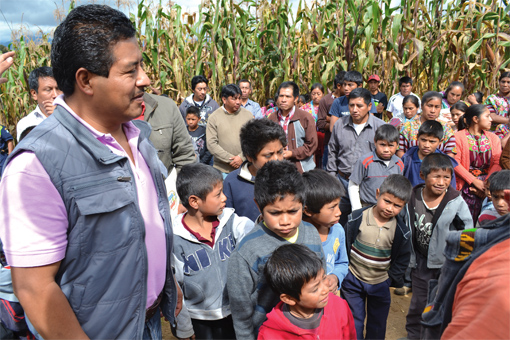Growing up in the Indigenous municipality of Patzún, Guatemala, Mardoqueo Cancax experienced first-hand the frustration of living in a community without good roads and adequate infrastructure. But when he became a parent, he felt even more keenly how such challenges imperiled the future of Patzún’s children. He joined a parents’ committee working on municipal development projects and educational improvements—eventually becoming the committee’s president.
By 2011, Cancax had become the mayor of his hometown—a progression that he says still surprises him. “To be honest, I didn’t have a political calling,” he says.
Others obviously disagreed. Two major Guatemalan parties—La Gran Alianza Nacional (The Great National Alliance—GANA) and El Partido Patriota (The Patriotic Party)—tried to recruit him as a candidate. He chose El Partido Patriota, but the 41-year-old is less concerned with party identity than with keeping his roots firmly in his hometown. Patzuneros, he says, need “a humble mayor who lives and shares with them, and who runs their municipality with transparency
and efficiency.”
To all appearances, he’s never deviated from that vision. Soon after his election in 2011, he founded a “digital democracy zone” to promote transparency and citizen participation. At the same time, he has been intent on preserving the cultural traditions of his community. Patzún, population 54,303, is 94 percent Indigenous. Most residents speak Kaqchikel, a Mayan language; but Cancax worries that younger generations are more preoccupied with improving their Spanish or learning a third language. “[Our language] is a treasure,” he observes.
Cancax has found a way to bring together both tradition and innovation. Since most patzuneros don’t have computers at home, the municipality opened a 35-computer digital community center that offers computer literacy courses in Spanish to residents—though most instructors also speak Kaqchikel. Other amenities include free Internet in the public square—a service that is generally used by students and youth—and access to Skype in the digital community center, where Patzún’s citizens can visit with family members living abroad.
For Cancax, computer literacy is also a key to improving government accountability. The town website is loaded with information about government programs and projects, as well as documents that outline how the municipality’s money is spent. And it provides information on the history and traditions of Patzún—in both Spanish and Kaqchikel. Other sites serve as a forum for communication between citizens and municipal employees: Patzún’s Facebook site, which has 1,844 followers, includes everything from praise for the municipality’s cultural events to locals asking for updates on road construction. Cancax says that such interaction is essential to good government: “if they talk to us and no one replies, that trust begins to get lost.”
But Patzún’s digital community initiative extends past the municipality and even Guatemala. The videos and photos published on Patzún’s social media sites are frequently viewed by patzuneros who have migrated to the U.S. or Canada. The YouTube video of the Sunday market alone has more than 13,000 views. The municipality’s Google Plus, Pinterest, YouTube, and Facebook sites have thousands of photos and videos documenting everyday life in Patzún—such as footage in Kaqchikel of elderly Mayan women teaching viewers how to make tayuyos to’om (tamales cooked in corn husk leaves) on piedras de moler (grinding stones).
Last year, the Asociación Iberoamericana de Centros de Investigación y Empresas de Telecomunicaciones (Ibero-American Association of Research Centers and Telecommunications) recognized the cultural impact of Cancax’s initiatives. During the XIV Encuentro Iberoamericano de Ciudades Digitales 2013 (XIV Ibero-American Meeting of Digital Cities 2013), Patzún won an award for its use of digital media to preserve and promote its cultural heritage.
Cancax is confident that Patzún’s participatory digital democracy initiatives can—and should—be replicated elsewhere. “This is an amazing tool that we have to take advantage of,” he says. “If we don’t, we are just wasting valuable time.”
View a YouTube video in Kaqchikel from Patzún, Guatemala below.





